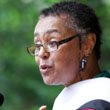Listen: President Chopp's Charge to Judy Richardson '66

Judy Richardson '66 H'12
I'm not going to try to give you any prescriptions for happiness or living a good life. You'll, hopefully, figure that out on your own. Instead, I'd like to talk very briefly (because this is your day) about my experience here at Swarthmore.
When Dr. Eldridge called to tell me I was being offered an honorary degree, I screamed. I mean like... "Ohmygod, I don't believe it..., oh, I wish my mother were still here..." When I finally calmed down he said, with some humor, "So, I guess that means you accept?"
Now my reaction actually surprised me. I had always thought of Swarthmore as something of an asterisk in terms of my work with the Student Nonviolent Coordinating Committee/ SNCC, the student civil rights movement ... and the movement that changed my life. But I realized - only recently - that Swarthmore was one of the main reasons I found that movement.
For it was here at Swarthmore, when I entered in 1962 as a freshman, that I came to meet some of the leaders of the SDS chapter on campus, the S'more Political Action Committee (SPAC). Now, understand, I went to that first meeting, not because of any commitment on my part, but because my mother was not there to stop me.
What I found was a group of Swarthmore students who were involved in serious community organizing: on-campus for better working conditions for the all Black cafeteria staff (you didn't bus your own trays when I was here) and off-campus, organizing with the Black community in Chester, Pa., to protest segregated facilities and a terrible school system. But it was through joining SPAC's bus trips to - and going to jail in - Cambridge, Md., on the eastern shore of Maryland, that my life really changed. It was here that I met strong African American community leaders - like Gloria Richardson and the young staff organizers of SNCC - and they were changing the world as I knew it. And I really thought I'd died and gone to heaven.
Now, our involvement in the demonstrations in Maryland was not heartily supported by Swarthmore's student community. In fact, our activities split the campus in two. My "big sister," who'd been so wonderful in showing me the ropes when I first arrived, stopped speaking to me. Others wrote disparaging articles in The Phoenix. I'd even overheard one student commenting that "Negro students would do better for their race if they'd just focus on their studies here and stop demonstrating." Another student said that restaurants had the right to deny service to anyone - they were, after all, the owners. And both of these were common opinions in the country at the time - South & North.
But, until recently, I'd dwelled only on that opposition and forgotten that it was Swarthmore that had provided space - unhindered - to the group that I'd been drawn to. Unknown to me at the time, Mimi Feingold, co-chair of SPAC, had recently returned from the 1961 Freedom Rides, where she had spent 6 weeks in the dreaded Parchman prison in Mississippi. When I became active, it was Penny Patch, a returning Swarthmore sophomore, who came to my room to suggest I take off a semester to join SNCC staff, as she had. She had just returned from being a staff organizer in SNCC's project in brutal Southwest Georgia.
I took Penny's suggestion and, after telling my mother that my full, four-year scholarship was secure (which was important since my mother had no money but had gotten my sister to Bennington College and me to Swarthmore) - and that it would only be for six months - I left to join the Movement. And my six months became three years.
But Swarthmore was the launching pad for so many of us because it provided a community where students were actually encouraged to think about the world around them - and about their place in that world (what a concept!). And it was a lesson that stayed with us. Mimi continued her movement activism in Louisiana's brutal Plaquemine Parishes; Carl Witman, her co-chair, became a major leader in the gay rights movement. Penny took the healthcare route, became a registered nurse midwife, and continues to be active in anti-racism work in Vermont.
And I worked in Georgia, Alabama, and Mississippi. In fact, everything I've done since - including my documentary film work - has been influenced by the Movement: its humane values and its expectation that you would continue to work for social change in whatever way was available to you. It was in SNCC that I realized that brilliance can be found not only in those who are college-educated, but also in amazing strategists like Fannie Lou Hamer, a Miss. sharecropper; or Amzie Moore, who nurtured and schooled young SNCC organizers working in Mississippi.
People will tell you (and this sounds hackneyed): find your passion. Now, it may not pay the rent - but, I am here to tell you - that really is what keeps you going.
And I was lucky enough to find that passion here at Swarthmore.
My gateway to that Movement - and to everyone and everything that came after it - was provided here, at Swarthmore. So - though it took me awhile to get to this, today I want to say thank you to Swarthmore. Not primarily for this honorary degree - which, of course, is really cool - but more for providing the vital and open environment that changed my life forever.


